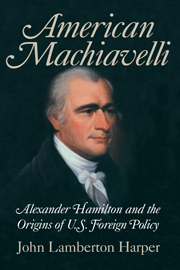Book contents
- Frontmatter
- Contents
- List of Illustrations
- Acknowledgments
- Miscellaneous Frontmatter
- Introduction
- PART I THE COMING OF NECESSITY
- PART II BATTLE LINES ARE DRAWN
- PART III SEIZING THE HELM
- 8 The Birth of American Neutrality, February–May 1793
- 9 “A Most Distressing Dilemma,” May–December 1793
- 10 Hamilton and the Crisis of 1794
- 11 The Jay Treaty
- PART IV INFORMAL ADVISER TO THE PRINCE
- PART V A PRINCE IN HIS OWN RIGHT?
- PART VI THE LESSER OF EVILS
- Conclusion: Hamilton Then and Now
- Notes
- Bibliography
- Index
10 - Hamilton and the Crisis of 1794
Published online by Cambridge University Press: 05 April 2013
- Frontmatter
- Contents
- List of Illustrations
- Acknowledgments
- Miscellaneous Frontmatter
- Introduction
- PART I THE COMING OF NECESSITY
- PART II BATTLE LINES ARE DRAWN
- PART III SEIZING THE HELM
- 8 The Birth of American Neutrality, February–May 1793
- 9 “A Most Distressing Dilemma,” May–December 1793
- 10 Hamilton and the Crisis of 1794
- 11 The Jay Treaty
- PART IV INFORMAL ADVISER TO THE PRINCE
- PART V A PRINCE IN HIS OWN RIGHT?
- PART VI THE LESSER OF EVILS
- Conclusion: Hamilton Then and Now
- Notes
- Bibliography
- Index
Summary
Introduction
War, in Machiavelli’s view of the world, was as natural and necessary an activity to a republic or principality as was breathing to an individual. But this does not mean it was something to be undertaken lightly: “Because anyone can start a war when he wants to, but not finish it, before taking on such an enterprise, a prince must measure his strengths, and govern his conduct on that basis.” He was bound to deceive himself, moreover, if he measured his strength simply on the basis of his financial resources, the loyalty of his subjects, or his geographic position – while lacking military forces of his own. Though he was not always so fatalistic on the subject, Machiavelli also warned against the hotheaded propensities of republics. “[T]here is no easier way to destroy a republic where the people possess authority than to take on bold enterprises; because where the people have weight, such enterprises will always be embraced, nor will a contrary opinion do any good.” It was an admonition which anticipated that of “The Federalist No. 6”: “There have been . . . almost as many popular as royal wars.”
There were times, moreover, when to survive, it was necessary to seek compromise, appease rather than fight, and even submit to disgrace. Faced with the choice of death at the hands of the victorious Sannites or returning home disarmed and under the yoke, a Roman consul observed that
no step could be excluded to save the fatherland; because the life of Rome consisted in the life of the army, it appeared to him necessary to save it by any means; and that the fatherland was well defended regardless of whether it was defended with ignominy or glory. Saving the army, Rome would have time to undo its disgrace; losing it, even if it died gloriously, Rome itself and its liberty would be lost.
- Type
- Chapter
- Information
- American MachiavelliAlexander Hamilton and the Origins of U.S. Foreign Policy, pp. 127 - 139Publisher: Cambridge University PressPrint publication year: 2004



